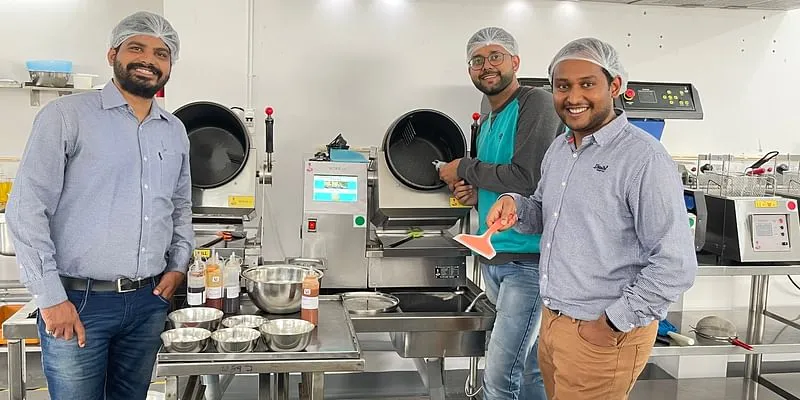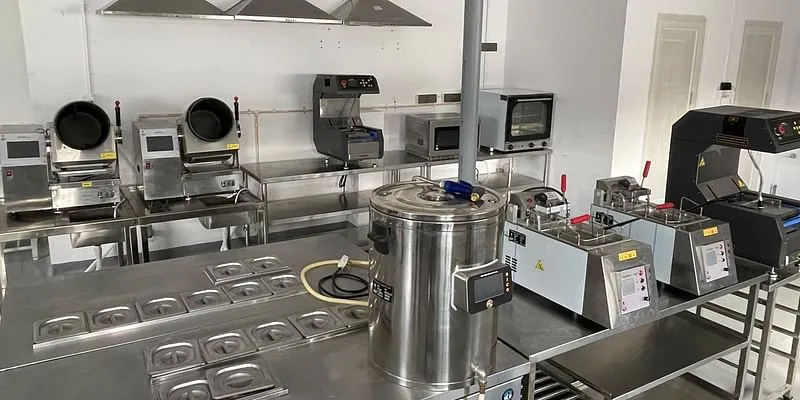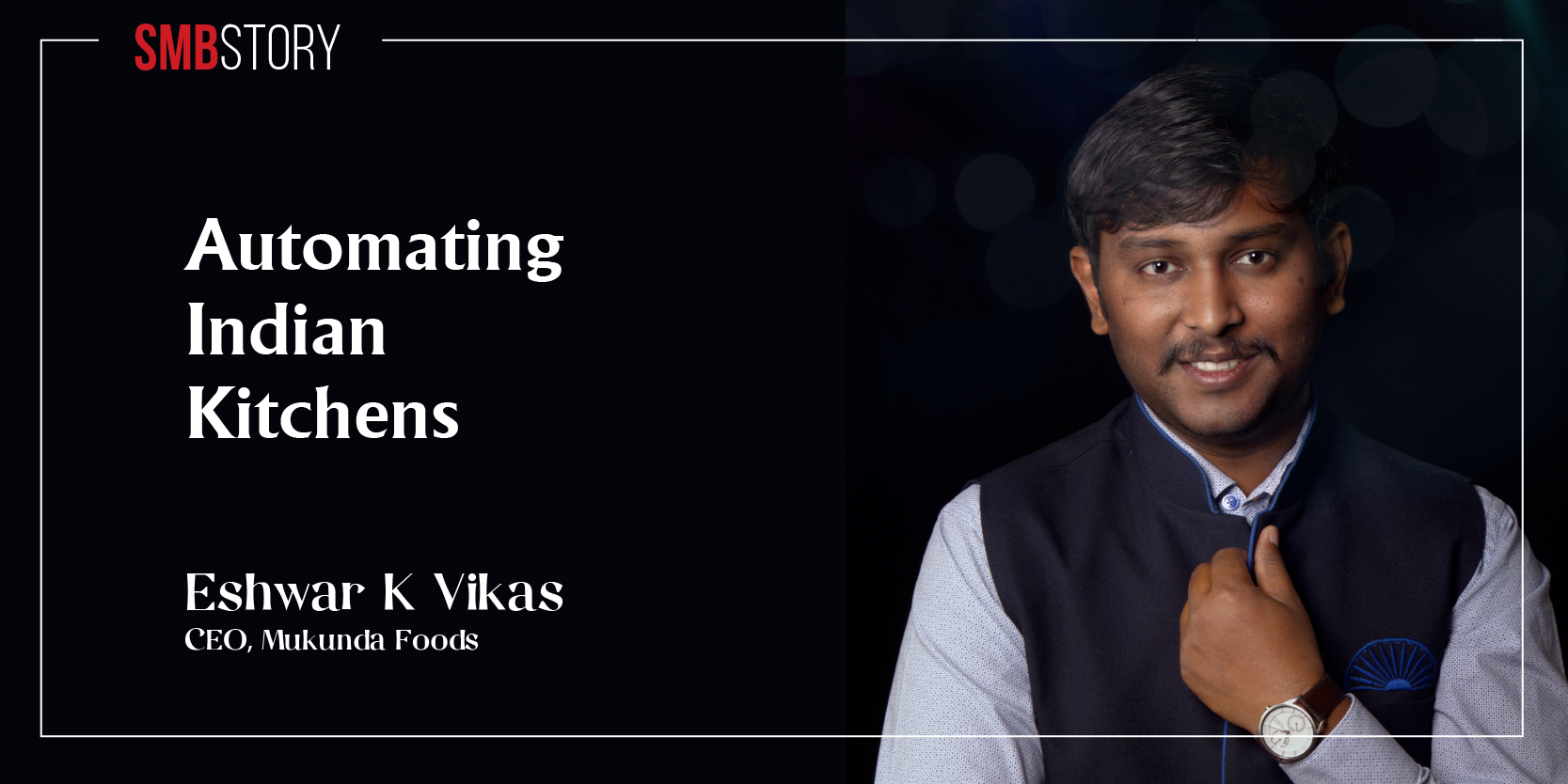How Mukunda Foods' kitchen robots dish out dosas, noodles and more
Bengaluru-based Mukunda Foods manufactures machines that make various foods without any human intervention. With COVID-19 paving the way for a contactless world, SMBStory explores how this brand is on a mission to automate Indian kitchens.
With the onset of COVID-19, businesses have realised that leveraging technology is the key to expecting any kind of success. In fact, it has accelerated the pace at which businesses, especially SMBs, are adopting technology.
This also means that India is ushering in a ‘new industrial revolution’- Industry 4.0- that is defined by the use of technologies like Internet of Things (IoT), connectivity, artificial intelligence, machine learning, automation, advanced engineering, and much more.
One of the newest trends to have emerged in the Indian manufacturing industry is factory automation. Industries are increasingly looking at cost-effective methods in production, and this has led to more automation in factories.
One of the companies that has managed to disrupt the FMCG space with its automation technology is Bengaluru-based Mukunda Foods. Its machines - DosaMatic, Eco Fryer, RiCo and Wokie, are all manufactured in-house, and used to make dosas, rice, noodles, and curries without any human intervention.
Founded in 2012 by SRM University alumni, Eshwar K. Vikas and Sudeep Sabat, Mukunda Foods, Eshwar says, is on a mission to automate the making of Indian foods. And now, with contactless products becoming more common due to the COVID-19 outbreak, there has never been a busier time for Mukunda Foods.
In a chat with SMBStory, Eshwar talks about how the company plans to make a place for itself in Industry 4.0.

From (Left to Right) Rakesh Kumar, CTO with Sudeep and Eshwar (Co-founders)
The journey
Sudeep and Eshwar launched Mukunda Foods as a chain of quick-service-restaurant (QSR) outlets in Bangalore to make and sell different kinds of dosas. Automation was not even on the cards, recalls Eshwar. However, after opening their third outlet, they started facing issues like staff not turning up or the chef taking too many leaves. This impacted the quality and consistency of food, and increased customer complaints, besides impacting the profits.
This is when Sudeep and Eshwar decided to leverage technology to automate their kitchen processes. Having an engineering background helped in taking care of the technicalities.
The company’s first product- DosaMatic- was made for Mukunda’s own outlets, says Eshwar. Gradually, other restaurant owners started taking note and placed orders for this machine.
Within Bangalore, DosaMatic became famous for “making dosas automatically.” As the orders grew day after day, the co-founders decided to transition from the QSR business model to manufacturing and selling these machines.
Later, they innovated and made more machines (such as RiCo, Eco Fryer and Wokie) to automate the making of other culinary dishes such as Chinese, North Indian, American and more.
Soon, Mukunda Foods was incubated by the Indian Angel Network (IAN). In 2013, the company graduated from the incubator and raised an investment round led by IAN investors Hari Balasubramaniam and P Gopinath. The company also raised funding from Ncubate Capital Partners, the venture capital arm of Gurugram-headquartered SAR Group in 2018. In all, it has raised Rs 40 crore.
When they had just launched, the machines were priced at around Rs 50,000. Today, they retail at Rs 1.5 lakh.
Becoming more efficient
In today’s fast-paced world, business owners have realised that innovation in manufacturing is as important as innovation in the final product in order to ensure customer satisfaction.
Eshwar says that the biggest challenge till date has been customisation. In manual cooking, a person has the freedom to add ingredients or fill the gaps even when a dish is ready.
But how do you give instructions to a machine, which works on a set pattern, to customise?
This is where hiring played the most important role - getting the right talent to help the team utilise technology most effectively. “Bangalore has many R&D centres and facilities. So, we were able to hire the brightest minds in automation,” Eshwar says.
Today, these machines have several options that help cater to the different tastes of a customer. For instance, the DosaMatic machine offers over 50 varieties of dosas, from crispy versions to uthappams - the options are aplenty.
In 2014, SMBStory visited the Mukunda Foods facility at Bangalore. Watch DosaMatic, the team and the manufacturing facility in action below:
An opportunity for SMBs
“Automation can really help brands who are struggling to be profitable. By adapting automation, they will be able to grow their businesses exponentially and remain profitable,” says Eshwar, adding that businesses will be able to significantly bring down cost and increase productivity and margins.
Outlining the expenses and costs associated with using these machines, he explains,
“A chef draws a salary of Rs 30,000-Rs 50,000 a month. Additionally, he cannot make more than 10 dishes in an hour. The machines, however, require a one-time installation cost and can make upto 30 dishes in an hour.” Other costs include the annual maintenance cost (about 3 percent) as well as energy cost (7-8 percent).
From an outlet requiring three-four people, the owners can now hire only one if they install these machines. It also reduces wastage of food as a limited amount of ingredients are input in the machine.
Today, Mukunda Foods counts several well-known names among its B2B clients including ITC, Rebel Foods, Wow Momos, Chaayos, The Bowl Company, etc. More than 3000 machines have been installed in India and in countries like the UK, the US, Australia and Singapore so far.

Machines installed by Mukunda Foods
Timely during COVID-19
At a time when the need for contactless transactions was at an all-time high due to the pandemic, Eshwar says Mukunda Foods was able to come to the aid of several hospitals in Bangalore. Hospitals that were facing staff shortage in their kitchens benefitted hugely from the deployment of these machines.
The company has also seen a huge uptake in the orders for these machines since the pandemic outbreak. Eshwar claims that in the pre-pandemic times, they were able to sell more than 150 machines quarterly, and this number has now gone up to more than 500.
Mukunda is also in the process of signing a deal with two international food companies to install these machines. Additionally, to penetrate deeper into the international markets, it is planning to set up demo centres in the locations it already exists.
Today, Mukunda is in the process of adding another business model to its existing one - Kitchen as a Service (KaaS). Through this model, the company aims to provide fully managed automated cloud kitchens to restaurant owners (including installation of machinery and one person to manage it). Eshwar says they are targeting 50 such models by the end of this fiscal year.
When asked about a key question on everyone’s mind regarding automation - about the possibility of job losses due to machines replacing humans, Eshwar admits that even If jobs are affected directly, it can be compensated in other ways.
“For instance, if a business owner now hires two people for an outlet for which it used to hire four, he can use the money saved to open and expand the number of outlets, which in turn will lead to more job creation.”
YourStory’s flagship startup-tech and leadership conference will return virtually for its 13th edition on October 25-30, 2021. Sign up for updates on TechSparks or to express your interest in partnerships and speaker opportunities here.
For more on TechSparks 2021, click here.
Applications are now open for Tech30 2021, a list of 30 most promising tech startups from India. Apply or nominate an early-stage startup to become a Tech30 2021 startup here.
Edited by Anju Narayanan












